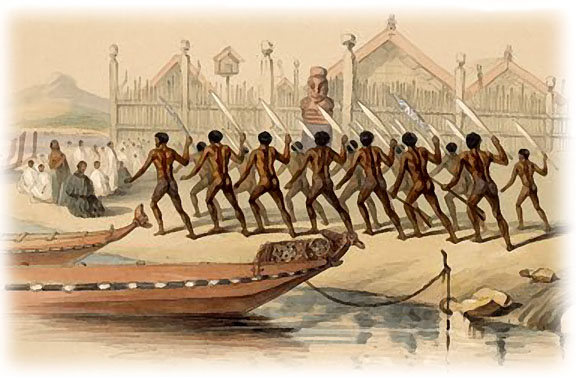Home - Kiwi Songs - Maori Songs - Search - Donate
A young warrior going into battle the first time experiences a wide range of emotions, and he grows to manhood.
|
Kikiki
kakaka! |
I'm
jabbering and quivering, |
"A very old chant, long antedating Te Rauparaha's period. It goes back several centuries...an ancient song of reunion and felicitation, often chanted at occasions of peace-making and such gatherings as marriage feasts." (Cowan 1935)
This is a journey to manhood. In his first battle, the young man first feels confused, unprotected and hemmed in. But he grows in confidence and becomes fully involved. Then he feels manly pride and togetherness. Who is this man? Hey, it's me!
Pre European Maori often fought naked. "Ka mate, ka ora" was added to this haka to express the extreme passions felt in battle.
I'm jabbering, shaking and naked
This West Coast haka may be compared with Rūaumoko, a battle haka used on the East Coast with with similar imagery.Two written sources have been found for this haka. James Cowan (1926) mentions that
"Ka mate, ka mate, etc.", is only a portion of a very ancient Maori chant. The original song begins, "Kikiki, kakaka, kikiki, kakaka. Kei waniwania taku aro."
And Tuwharetoa historian Sir John Grace (1959) quotes a slightly garbled version of "Kikiki" in a humorous account of Te Rauparaha's humiliating experience when he revisited the Taupo district.
The Maoris in the Great War: (Maori Regimental Committee, Auckland, 1926) p 181.
The Wisdom of the Maori, (NZ Railways Magazine, February 1, 1935)
John Te H Grace, Tuwharetoa : the history of the Maori people of the Taupo district. (Reed, 1959)
Mervyn McLean, Maori Music (University of Auckland Press 1996)
Published on Folksong.org.nz in Sept 2008
© 2008 by John Archer
